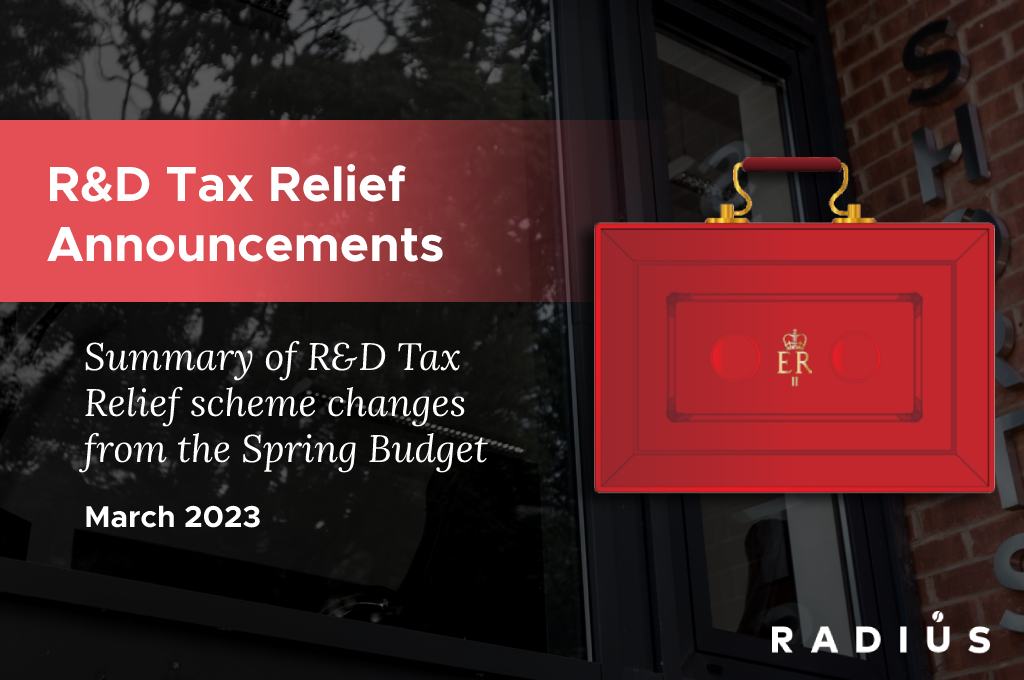
Following on from the draft legislation that was published in December 2022, further details and some revisions were published in the Chancellor's Budget on 15 March 2023 as the government looks to legislate the R&D reforms in the Spring 2023 Finance Bill.
These reforms will mainly apply to any company making an R&D claim where its accounting period begins on or after 1 April 2023.
As expected, the legislation will;
- Create two new categories of qualifying expenditure for R&D tax relief, on data licenses and cloud computing services.
- Expand the definition of R&D for tax reliefs to include pure mathematics
- Mandate that companies must inform HMRC of their intention to make a claim for R&D tax relief using a new digital form. This requirement will apply for claims to relief for accounting periods starting on or after 1 April 2023. As this measure is intended to allow HMRC to perform more upfront compliance on new claimants, companies which have claimed R&D tax reliefs in the previous three years will be exempted from this requirement.
- Require companies to provide a digital additional information form with their claims. This requirement, only, will apply to all claims made on or after 1 August 2023.
The previously announced restriction on some overseas expenditures will now come into effect from 1 April 2024 instead of 1 April 2023. This will allow the government to consider the interaction between this restriction and the design of a potential merged R&D relief which has been consulted on recently.
Our commentsWhilst we welcome the decision to delay the restriction on overseas costs, as this will allow those companies who do use overseas agency staff and contractors more time to strategically plan R&D activity going forward to make the most effective use of the reliefs, the measure to pre-notify HMRC of their intention to claim seems overly bureaucratic and ill targeted. Even the House of Lords' review into R&D questioned the effectiveness of this measure, which has mainly been introduced to reduce perceived fraud and error in the scheme, but it will only affect companies who have not previously claimed or have claimed but not in the previous 3 years. The requirement to submit the “additional information” form digitally for all claims submitted on or after 1 August 2023 is slightly surprising as previously it was announced that this would only apply where your accounting period begins on or after 1 April 2023. This will mean that companies will need to ensure that they are keeping accurate and comprehensive project records to ensure that this form can be correctly completed, and our intention is to work with our clients to ensure this can be done. |
R&D rate changes
Changes previously announced to the rates for SME and RDEC schemes will still apply from 1 April 2023. As a recap:
- SME deduction will decrease from 130% to 86% and net Corporation tax (CT) saving for a profit-making company reduced from 24.5% to 21.5% (based on the main rate of CT of 25%).
- The SME payable tax credit is reduced from 14.5% to 10% with the net cash benefit for loss making companies reduced from a maximum of 33% to 18.6%.
- RDEC scheme for large companies or certain SMEs increased to 20% from 13% resulting in the net tax saving increasing to 15% from 10.7%.
In addition to the above, the government also announced;
- A higher rate of SME payable credit of 14.5% will apply to loss-making SMEs which are R&D intensive. To be R&D intensive the company’s qualifying R&D expenditure must be 40% or more of the company’s ‘total expenditure’ for the period. This equates to a receipt of £27 for every £100 of R&D expenditure.
Note: the higher rate for R&D-intensive SMEs has yet to be passed through the Finance Bill and draft legislation will be published for technical discussion in the summer of 2023. In the meantime, companies that qualify and wanted to make a claim can either defer making a claim until the legislation is passed, or they can make a claim using the 10% rate, and then make an amended claim once the 2023/24 Finance Bill publishes the legislation.
The merging of the SME and RDEC schemes is still being considered as the government considers the responses to the consultation that closed on 13 March 2023. No decision has been made yet, but it is an option being considered from April 2024.
With increased HMRC compliance activity ongoing, the R&D tax relief landscape is changing and the accuracy of claims and getting the correct professional advice has never been more important in the 23 years R&D reliefs have been in existence in the UK.
The Radius team at Shorts which includes an ex-HMRC R&D Inspector are experts that are passionate about “R&D tax reliefs done properly” and keen to work with existing and prospective clients to ensure this still generous relief is accessed by the companies that are eligible to claim.
Read more about the Spring Budget 2023
This summary is part of a series of detailed summaries of the Spring Budget 2023 by the Shorts team. Read the latest announcements and analyses below:
- Personal Tax announcements
- Business Tax announcements
- Capital Tax announcements
- Employment announcements
- Other measures
If you have a query about a specific measure announced in the Spring Budget that is not entirely answered below, or in a corresponding summary, please get in touch with our team for advice.

Darryl Hoy
Darryl is the Technical Director of the Radius team. He is a specialist in Research & Development tax reliefs, having previously worked at HMRC as an R&D Tax Inspector.
View my articles